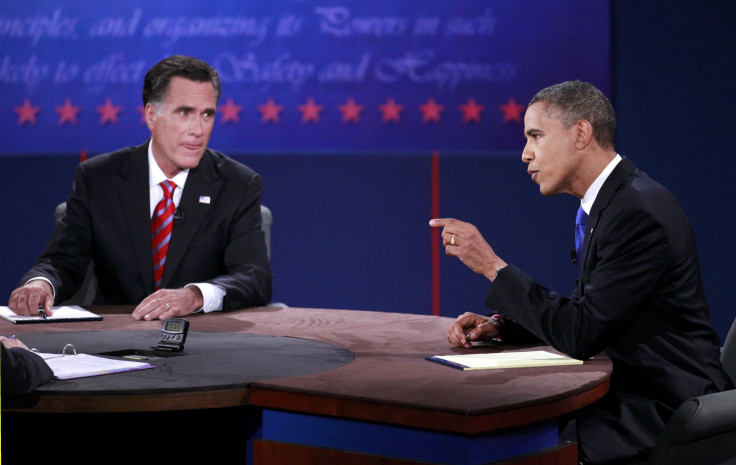In Foreign Policy Debate, A Focus On Home

Few sharp differences emerged in Monday night's third presidential debate, a foreign policy-focused affair in which President Barack Obama and Republican challenger Mitt Romney frequently strayed into the domestic issues that have dominated the campaign throughout.
Romney's foreign policy platform centers on the premise that Obama has undercut American clout abroad and emboldened its adversaries, and the Republican pressed that argument throughout the night.
“I don’t see our influence growing around the world," Romney said. "I see our influence receding."
But Romney offered little in the way of specifics to bolster his argument. At times, such as in response to a question about Obama's expanded use of unmanned drone aircraft, Romney explicitly backed the president.
While Romney called for a "comprehensive and robust strategy to help the world of Islam" repudiate religious extremism, he failed to lay out a program to accomplish that ambitious goal. He repeatedly said that Iran is "four years closer to a bomb," but did not offer concrete ways to expand on the already biting sanctions imposed on Iran by the Obama administration (although he did call for Iranian President Mahmoud Ahmadinejad to be indicted for inciting genocide against Israel).
The overlap was clear when the questions turned to Syria, where Romney has accused Obama of not doing enough to stop the bloodshed. But Romney's solution -- work with allies in the region to vet the Syrian opposition for non-jihadist elements while eschewing direct military intervention -- closely tracked the president's plan.
“He doesn’t have different ideas, and that’s because we’re doing exactly what we should be doing to try and promote a moderate Syrian leadership and an effective transition so we can get [dictator Bashar] Assad out," Obama said in reference to Romney's answer.
Obama defended his record on foreign policy by saying that he had killed Osama bin Laden, begun extricating America from its long conflicts in Iraq and Afghanistan and rebuilt frayed alliances around the globe. But he returned throughout the night to the idea that, to preserve its influence abroad, the United States needs to turn to "nation building here at home."
“It’s very hard for us to project leadership around the world when we’re not doing what we need to do here," Obama said.
Indeed, the contest often seemed closer to a domestic policy debate than a dispute over foreign policy. Obama touted his signature Race to the Top education program and his rescue of the automobile industry while calling for higher taxes on the wealthy; Romney cited anemic employment gains and talked about expanding domestic energy production.
“In order to be able to fulfill our role in the world, America must be strong," particularly economically, Romney said.
Saying that “our purpose is to make sure the world is peaceful," Romney argued that maintaining military supremacy is central to that goal. He argued that Obama has damaged that imperative by cutting military spending.
“We don’t know what the world is going to throw at us down the road,” Romney said, arguing that “we need to make decisions based on uncertainty.”
But Obama pushed back on that view, arguing that Romney held an antiquated notion of military capabilities. In response to Romney's charge that the U.S. military has fewer ships than it did a century ago, the president replied, "Well, Governor, we also have fewer horses and bayonets. The nature of the military has changed." Obama got in a similar barb when he referenced Romney's having called Russia "our number one geopolitical foe."
“When it comes to foreign policy you seem to want to import the foreign policies of the 1980s, just like the social policies of the 1950s and the economic policies of the 1920s," Obama said.
While the president has worked with the Pentagon to cut $450 billion over the next decade, he distanced himself on Monday night from a looming $600 trillion cut automatically set into motion by the failure of a special deficit-cutting "super committee" in Congress.
“The sequester is not something I’ve proposed," Obama said. "It’s something Congress has proposed. It will not happen.”
And Obama reprised his argument that Romney's call for more defense spending, coupled with a 20 percent across-the-board tax cut, will necessarily increase the same deficit that Romney has called a mortal threat to American prosperity.
“The math simply doesn’t work,” Obama said.
© Copyright IBTimes 2024. All rights reserved.





















